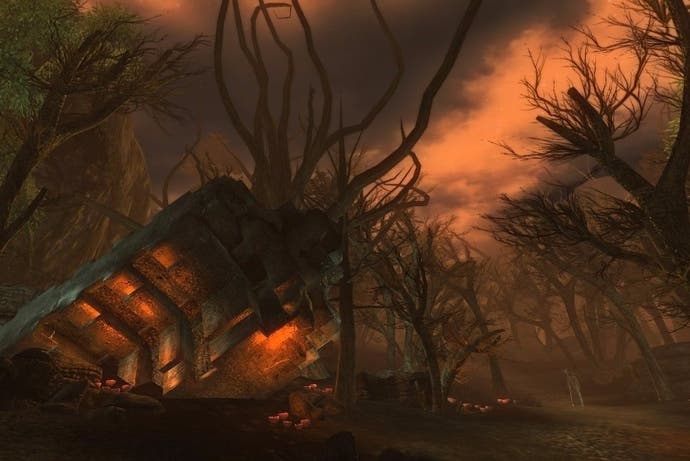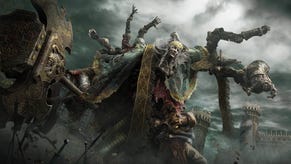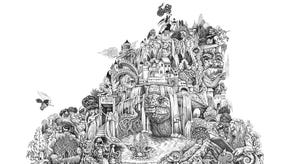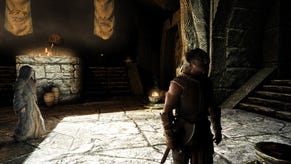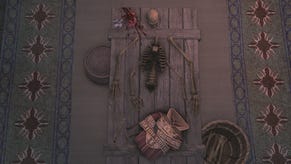What keeps modders modding?
The story of SureAI, the team rebuilding Skyrim for free.
In 2006, the Bethesda Games Studios team that brought fantasy RPG The Elder Scrolls 4: Oblivion to life comprised over 300 people. In 2013, in an interview prior to the launch of Watch_Dogs, Ubisoft managing director Pauline Jacquey said that a typical open world action game requires between 400 and 600 staff to make it happen. In 2012, Warren Spector claimed "over 700 people around the world" were working on his then upcoming project Epic Mickey 2. Big games require big studios, it seems.
Sure AI, on the other hand, is a small hobbyist group from Munich that makes Elder Scrolls total conversion mods. The seven-strong core team is currently hard at work developing its upcoming Skyrim reconstruction Enderal: The Shards of Order, which it hopes to release early next year. Its previous project, Nehrim: At Fate's Edge - an Oblivion total conversion - has accrued over one million downloads since launch in 2010 and has won several awards, not least ModDB's Mod Of The Year on two separate occasions.
Unlike Oblivion, Nehrim's dense forests, barren deserts and ancient crypts were all painstakingly hand-built and not articulated via sophisticated landscape generators. New stories, characters and scenarios were implemented from scratch and its systems overhauled. SureAI's mods, then, are as much fully-realised games in their own right as they are modifications of existing games. By the time Nehrim released, just two people worked on it.
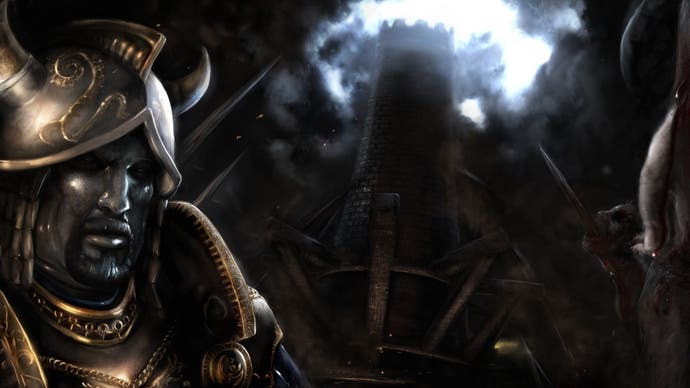
"The problem with total conversion mods is that when people work on a voluntary basis they're doing it mostly for fun," explains Nehrim project lead and SureAI co-founder Johannes Scheer. "This is simply because they don't want to be professional developers and this leads to people having less of a sense of responsibility. Volunteers are very active when the project kicks off - they feel like pioneers and it's fun concepting stuff, prototyping it, but the longer the project goes on the more likely people are to disappear.
"As the tasks become more tedious - bug fixing, polishing, that sort of thing - people are less likely to be around. This is very hard to deal with and a lot of non-commercial groups break up because of that. A lot of good projects don't get finished."
Scheer adds that around 70 percent of the folk that signed up for Nehrim in the beginning left after just one month, having contributed nothing to the project at all. Of the remaining 30 percent, one fifth had abandoned ship before its first birthday. Nehrim was cancelled, then rebooted, and in the end it was Scheer and company co-founder Dennis Weich who steered the mod to the finish line. As you might expect, realising such an ambitious project in regular circumstances would've been challenging enough, far less in such compromising conditions.
What Scheer and Weich put in place is impressive. The eponymous Nehrim continent is split into three realms, as well as the ancient kingdom of Treomar, all of which exist in the world of Vyn. Politically, Nehrim's refined narrative sees the cold and mountainous Northrealm at war with the verdant Middlerealm; while the exotic Southrealm is ruled cautiously by the Temple of the Creator. The ancient runic kingdom of Treomar lies peacefully to the west, yet, perhaps expectedly, theocracy, monarchy and democracy prove an incongruous mix within the bounds of the land's political, economic and socio-political spheres.
Add this to a deep, cultured and overhauled skill system and, again, it's hard to view Nehrim as the free-of-charge total conversion mod that it is, and not a fully-fledged game in and of itself - particularly considering it offers a playground similar in size to its spiritual predecessor. By taking all of the elements they enjoyed from Oblivion, then, Scheer and Weich set about improving what they perceived as its weaknesses. They concepted what they wanted to change, formed a plan of action, pulled their ideas together and then realised most of it didn't make sense.
"A lot of the stuff we concepted, admittedly, didn't make it into Nehrim," admits Scheer. "That said, I think - and this is something that's true in all non-commercial projects - they never work out as planned. There's so many variables and things you can't plan with."
One feature Scheer was determined to get right in Nehrim's development was Nehrim itself: exploring the mod's setting would play a far more integral role here than roaming Cyrodiil ever did in Oblivion. Scheer's attention to detail while illustrating his landscapes is something Nico Lietzau, one of SureAI's Enderal project leads, speaks highly of. Simple things like the erosion of rocks, says Lietzau, are details absolutely essential in crafting believable scenery, something Scheer does with absolute equanimity.
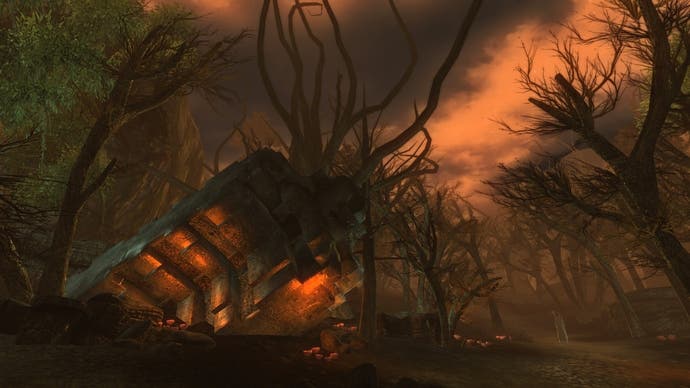
"If you'd never done level design before, you'd never think that knowing how erosion works is important, but it is," says Lietzau. "Depending on how the rocks are facing - it just feels odd if it's done the wrong way. But you'd never as a player think, 'this scene looks weird because the rocks are facing the wrong way', you'd simply think the scene looks weird but you couldn't put your finger on why.
"Getting this absolutely right was important because Nehrim is a game that puts a lot of emphasis on exploration. With a generated environment it's very hard to keep the world interesting. If things start looking too generic, exploration isn't fun anymore. Johannes told me they actually experimented with generators in the beginning and they just felt it was too boring. There was no motivation for the player to keep going because there was nothing to be found."
Since Nehrim, SureAI has become far more organised. Lietzau recalls similar commitment issues when work began on Enderal - he's lost count of how many would-be contributors' hard drives crashed around that time - but admits now being centralised in an office promotes a steady workflow and helps maintain regular communication between team members.
Like Nehrim before it, Enderal has overhauled its forerunner's systems adding processes that SureAI feels now better represent player progression. There's a similarly dark and complex storyline that incorporates alluring political overtones, but what's most different this time round is hype. The turbulence that struck Nehrim at the beginning of its development had many doubting it'd ever see the light of day. Press coverage pre-release was few and far between and, as there were already a few reasonably accomplished Oblivion total conversion mods on the market at that time, expectations were low.
Upon release, Nehrim was received "very positively", says Lietzau, a fact he attributes to the pre-emptive interest Enderal continues to garner. ModDB has already awarded the Skyrim total conversion with Mod Of The Year for the last three years running, adding to the burgeoning pressure the team already feels. While pressure is expected and welcomed, SureAI seems to now be caught in no man's land as a voluntary outfit producing professional work.
"It's been frustrating at times because people sometimes treat us as a group not to be taken seriously," laments Lietzau. "For example, a popular German gaming magazine asked us for a test version of Enderal. We sent them the alpha version, which they reviewed and attached a rating to. They didn't even bother playing the final version.
"The score, overall, wasn't that bad - I think it was 76 out of 100, or something - but, yeah, they just didn't test the final version. It was pretty ridiculous. I think they thought it was appropriate because we weren't, in their eyes, a big deal. They said something along the lines of: 'don't expect any special treatment from us because you're not a commercial project'."
While it's true Enderal is not a commercial project, it's scale and ambition, size and scope - it's to include more than double the amount of dialogue found in Dragon Age: Origins - make it equivocal to one. Lietzau tells me his average week sees him sink 40-60 hours into the development of Enderal, and that some of the team have been picked up by professional studios along the way.
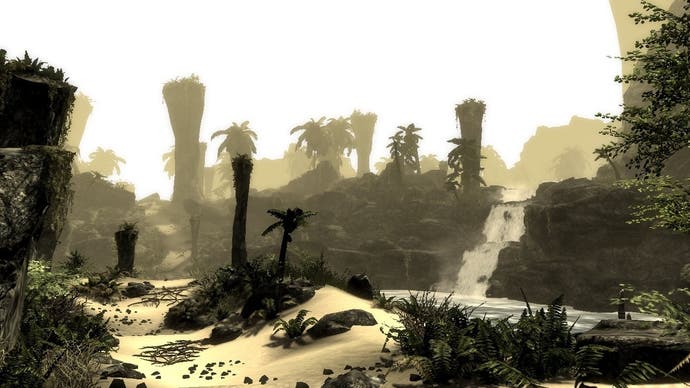
So why do it for free? Going professional might be hinged on Enderal's success, but the subject of charging a nominal fee was raised by one forum user on SureAI's website off the back of the SkyUI creator's decision to begin charging $1 for his Skyrim user interface mod. SureAI assured fans that Enderal would be released free-of-charge, but the backlash among some users gave Lietzau, as he saw it, cause for concern.
"The whole paid mod thing was really frustrating for us. Basically some people thought we kept it free for the wrong reasons. I know it's just a case of those who shout the loudest are the ones you'll hear but it was frustrating because we were certain people appreciated our work and now we're not so certain anymore. It feels like they only appreciated it as long as it they get it for free.
"Even at the thought of players paying just one dollar - some began threatening us and some of the reactions were so over board. We heard the creator of SkyUI got death threats for what he proposed!"
Nonetheless, Enderal will launch for free and of course what the future holds for SureAI remains to be seen. As hobbyists, the team's dedication is unwavering and unquestionable - by the time of the mod's proposed release next year, they'll have been working on Enderal, for free, for half a decade. As a game design student on the cusp of graduation, how Enderal is received will shape the direction of Lietzau's prospective career. I ask him how he deals with this on a personal level.
"Personally, the longer you work on something - I've spent the last four years of my life working on this project, full time, which is insane - the more important it becomes. The more you work and the more effort you put in and the more people that join up, the more pressure you feel.
"I don't know, other people might spend that time raising kids. This feels the same."
